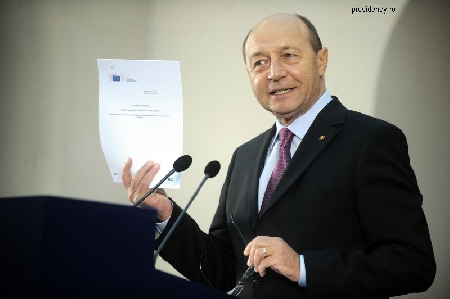Controversies on the Criminal Code
Romanian MPs have once again shown how they dont hesitate to grant themselves privileges, especially when it comes to justice.

Florentin Căpitănescu, 11.12.2013, 13:42
Romanian MPs seem to deepen the huge image deficit of the Romanian Parliament, a fundamental institution of the state, as term after term, they are trying to build a cocoon, to keep them safe from the arm of justice. Majorities have changed, MPs have changed as well, but bad habits seem perpetual and rejuvenated, if we take a look at the schemes they use to promote and defend their own interests. Proof that no effort is big enough when it comes to granting themselves privileges, is the fact that the members of the Legal Committee of the Chamber of Deputies worked until midnight on a series of amendments they intended to bring to the Criminal Code, which were adopted the very next day, in plenary session, by an overwhelming majority, and at an incredibly fast pace, suitable for a better cause. The main novelty is that the president, MPs, and those practicing liberal professions will no longer have the status of public servant and implicitly will no longer be investigated for or charged with corruption, abuse of office, bribe taking and influence peddling, or for conflict of interests.
One of the arguments used by MPs in their defence is that they are elected and not appointed, they do not have employment contracts, do not enjoy rights specific like other public servants, and they don’t administer patrimonial goods, either. Furthermore, they claim that in any European country with a democratic tradition, MPs do not have the status of public servant. But, as some pundits note, they seem to forget that the incidence of illegal activities by MPs in older democracies is much lower than in Romania’s Parliament.
Data made public by the National Anticorruption Directorate and the National Integrity Agency, two of the institutions that might be left unemployed for lack of activity, are eloquent. Some 30 MPs are being tried or have already received sentences in cases investigated by the National Anti-Corruption Directorate, considered to be the most important piece in the anti-corruption mechanism of the state. 25 investigations involving MPs, found in a situation of conflict of interest by the National Integrity Agency, might be compromised. With the adoption of the amendments, MPs are now under the scrutiny of the Romanian President, Traian Basescu. He made a connection between these changes and a future report to be issued by the European Commission on the Romanian judiciary, which is monitored under the Cooperation and Verification Mechanism.
The changing of the criminal code to favour politicians is something unforgivable, we have no excuse for that, and I can already anticipate how that report will look like. Undoubtedly, it will include the phrase “there is no political will to fight corruption!”
The Higher Council of the Magistracy has positioned itself on the same side of the barricade, as this body should have endorsed first the amendments to the Criminal Code.






























